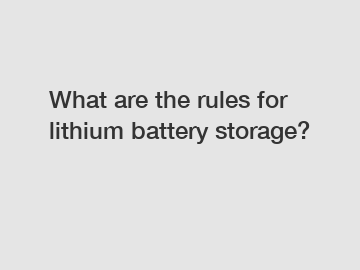Lithium batteries have become an integral part of our daily lives, powering everything from our smartphones and laptops to electric vehicles and grid storage systems. However, storing lithium batteries safely is crucial to prevent accidents and damage. In this blog post, we will discuss the rules and best practices for lithium battery storage to ensure their longevity and safety.
Rule 1: Store batteries in a cool, dry place.
One of the most important rules for lithium battery storage is to keep them in a cool, dry place. High temperatures can degrade the battery and shorten its lifespan, while moisture can cause corrosion and damage. Ideally, lithium batteries should be stored at room temperature (around 20-25 degrees Celsius) with a relative humidity of less than 50%.

Rule 2: Store batteries at a partial state of charge.
When storing lithium batteries for an extended period, it is recommended to keep them at a partial state of charge (around 40-60%). Fully charging or discharging the battery before storage can cause stress on the cells and reduce their longevity. Most lithium batteries come with a storage mode feature that automatically adjusts the state of charge for long-term storage.
Rule 3: Use the original packaging or a battery case.
To prevent physical damage and short circuits, lithium batteries should be stored in their original packaging or a dedicated battery case. Avoid storing loose batteries in a drawer or pocket where they can come into contact with metal objects or other batteries. Additionally, make sure to keep the battery terminals covered with insulating caps to prevent accidental short circuits.
Rule 4: Keep batteries away from flammable materials.
Lithium batteries are highly flammable and can pose a fire hazard if not stored properly. It is important to keep them away from flammable materials such as paper, fabric, or other chemicals. Store batteries in a well-ventilated area away from heat sources or open flames to reduce the risk of fire.
Rule 5: Regularly check the batteries for signs of damage.
Before storing lithium batteries, inspect them for any signs of damage such as swelling, leaks, or corrosion. If you notice any abnormalities, do not use the battery and dispose of it according to local regulations. Regularly check the batteries during storage to ensure they are in good condition and have not been compromised.
Rule 6: Do not expose batteries to extreme temperatures.
Extreme temperatures, both hot and cold, can have a negative impact on lithium batteries. Avoid storing batteries in places where they can be exposed to direct sunlight, such as a car dashboard or window sill. Similarly, avoid storing batteries in freezing temperatures as this can cause irreversible damage to the cells. If you need to store batteries in a cold environment, make sure to warm them up gradually before use.
Rule 7: Properly dispose of old or damaged batteries.
When lithium batteries reach the end of their life or become damaged, it is important to dispose of them properly. Do not throw batteries in the trash as they can leak toxic chemicals and pose a risk to the environment. Instead, take them to a recycling center or drop-off location that accepts lithium batteries for safe disposal.
In conclusion, following these rules and best practices for lithium battery storage can help ensure their longevity and safety. By storing batteries in a cool, dry place, at a partial state of charge, and away from flammable materials, you can prevent accidents and damage. Regularly checking the batteries for signs of damage and disposing of old or damaged batteries properly will also contribute to a safe and sustainable storage solution. Remember, safety always comes first when dealing with lithium batteries.
For more Single Phase String Inverter for France, Solar Panel String Inverter for USA, Multi-mode AC coupled inverterinformation, please contact us. We will provide professional answers.





Comments
All Comments ( 0 )